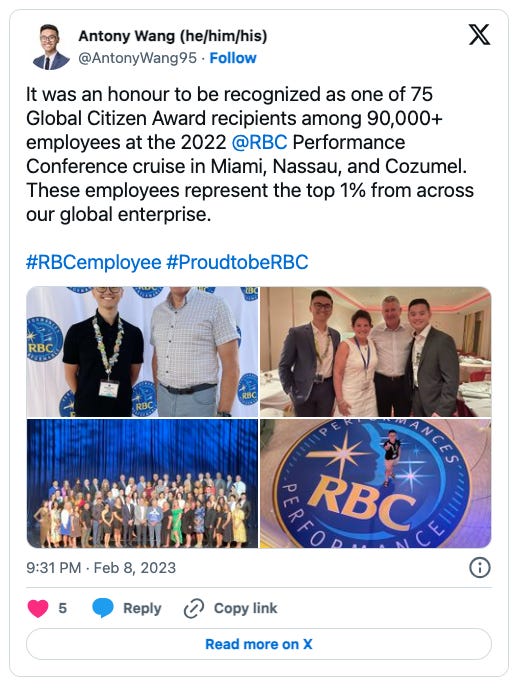Never underestimate the extent to which organizations operating under the Old Economics will go to perfect faulty practices like performance management. From a story posted by Global News here in Canada:
Fifteen hundred top performers from RBC were flown to the Caribbean in January on an eight-night all-inclusive luxury cruise aboard a large ship, according to social media posts by participating bank employees.
As shown in the post above from X, this means the classic “Top 1%” who just won the equivalent of a performance management lottery, which of course reminded me of Deming’s quip about this fantastic contribution to management while running his famous Red Bead Experiment at a seminar:
Mr. Wang should be less honoured about his award and more contrite if only for the message it sends to his fellow employees who didn’t win: “I’m favoured and you’re not.”
As we’ve learned here long ago, and as Dr. Deming explained well before that, this style of award has very little to do with performance and a lot to do with being on the right side of an undulating wave of common cause variation in the system, which he referred to as rewarding the weatherman for a nice day.
How is performance of an individual in a system measured? In the Old Economics, by a KPI like sales revenue, or meeting or exceeding some numerical target. Dr. Deming contested this as a false representation because the KPI doesn’t take the system into account:
Let x be the contribution of some individual, (yx) the effect of the system on their performance. Then suppose that we have some number for his apparent performance such as eight mistakes for the year… Then
x + (yx) = 8
We need x. Unfortunately, there are two unknowns and only one equation. Johnny in the sixth grade knows that no one can solve this equation for x. They ignore the other term (yx), which is predominant.
What RBC has done with the Top 1% cruise is ignored (yx) and pretended that x is the predominant term to create the most extreme form of employee performance incentivation I’ve come across to-date. However there is an eventual downside to this, for one cannot forever be on the right side of the wave — one day, through no apparent fault of their own, some of the 1,500 on this cruise will become the losers, perhaps even within a year or two and be shown the door. It’s happened many times before, and even to myself and some of my coaching customers.
What do you think? Do you have similar stories? Tell me in the comments below or on Chat. Also, if you like what I do with this newsletter consider sharing it with your friends and colleague to get them in on the learning, and if so inclined help me keep caffeinated with a coffee.




This has echoes of the annual "sales meeting" where sales teams would be seconded to an exclusive location, exhorted for their amazing performance, sales rewards handed out, and lots of libations consumed.
Some companies combine that with inviting their top customers or contest winning customers to the event.
If management theory was accurate, these events would result in higher sales in the following year, the top performers always being rewarded, and customer relationships strengthened so that they signed additional contracts and drove more revenue.
But they don't.
Reps would win because of how their territories or customers were assigned; what their product mix was, based on the luck of a big job landing in their laps.
Big customers come, enjoy the golf and beer, head home, and demand a 10% reduction in pricing in the next call.
No deals signed. No improvements created. Nothing sustainable passed along or learned.
Meanwhile, whilst the teams were away, sales continued, products were shipped, and the departments left behind wondering what all the fuss was about, and why there weren't recognized for on-time delivery, meeting inventory targets, maintaining uptime expectations, improving customer service.
It gets back to how David Mamet put it in Glengarry Glen Ross:
"Have I got your attention now? Good. 'Cause we're adding a little something to this month's sales contest. As you all know, first prize is a Cadillac El Dorado. Anyone wanna see second prize? Second prize is a set of steak knives. Third prize is you're fired. Get the picture?"
Winning is almost impossible, whether in the lottery, athletics or at work. Also, competition is (generally) not good for performance. Why? Because most people don't win - they lose (numbers 2, 12, 54 in the competition). Therefore, rewards of "stars" in companies are stupid. As a rule, it is the system that decides who wins and loses.